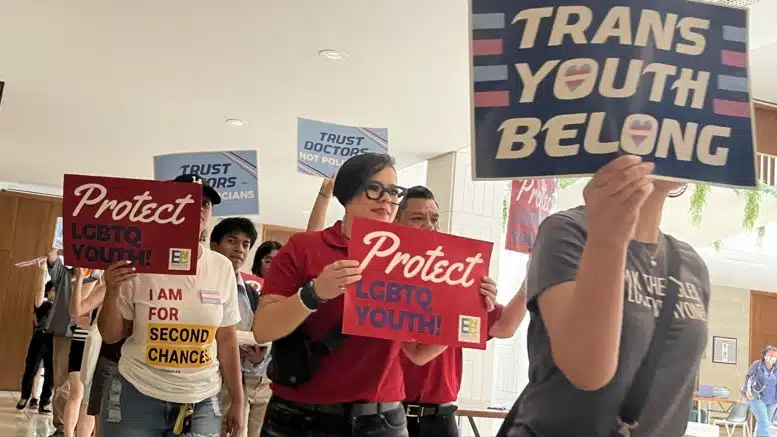By Lucas Thomae
Since the recent passage of several bills affecting LGBTQ youth in the North Carolina General Assembly, there’s not much that people in those communities can do besides strategize for what lies ahead.
After more than 50 minutes of debate on the Senate floor Tuesday, lawmakers passed House Bill 808, which restricts gender-affirming care for minors and prohibits state funds from being used for that care, by a party-line vote of 29-16.
The bill is nearly certain to become law, considering Republicans’ veto-proof supermajorities in the North Carolina Senate and the House of Representatives. Nonetheless, the future of gender-affirming care in the state is uncertain.
A rally organized by the advocacy group Equality NC took place outside of the legislative building in downtown Raleigh ahead of Tuesday afternoon’s vote. Relatives of transgender youth, a family doctor and representatives from Planned Parenthood South Atlantic and the ACLU of North Carolina were among those who spoke, surrounded by a crowd of several dozen people.
“When I say that access to gender-affirming care is life-saving, that is not hyperbole,” said Riley Smith, a family doctor based in Durham who provides gender-affirming care. “These politicians simply have no idea what it means to take that care away.”
After the rally, the group marched in silence in and around the legislative building, making a half dozen circuits of the interior courtyards. All the while, the protesters hoisted signs with messages of support for the LGBTQ+ community.
At 4 p.m., the protesters filled the public viewing gallery overlooking the Senate floor to witness the debate and voting. After the bill passed, chants of “protect trans kids” rang down from the gallery, prompting Senate Leader Pro Tempore Phil Berger (R-Eden) to call for order as sergeants-at-arms and police officers cleared the space for the remainder of the session.
Another fight on the floor
Despite the fact that the fate of House Bill 808 was all but decided, Senate Democrats made their opposition to the bill heard. Four of them proposed amendments intended to call out what they saw as hypocrisy from Republicans.
Senate Minority Whip Jay Chaudhuri (D-Raleigh) proposed an amendment that would add a section with separate bills of rights for parents and for students.
North Carolina Republicans are currently promoting a Parents’ Bill of Rights that would require parents to be notified if a student changes the name or pronouns that they use in school. Opponents to that bill argue that this would force teachers to “out” LGBTQ students to their parents.
Chaudhuri’s amendment would have enumerated students’ rights to “a learning environment in which discrimination in all forms is not tolerated” and “a feeling of safety and comfort at school.”
“This bill represents yet another example of letting politicians decide and not letting parents decide,” Chaudhuri told his fellow legislators.
After Chaudhuri’s amendment was tabled with a party-line vote, three other Democratic amendments met the same fate. One would have created a study group on the increase of mental health disorders in children and provided $5 million in funding to the Suicide Prevention Lifeline. Another would have banned licensed medical professionals from engaging in conversion therapy with minors and adults with mental disabilities, and a third would have raised the legal marriage age to 18.
Berger challenged the idea that the bill doesn’t adequately address the potential adverse effects on the mental health of LGBTQ+ youth.
“I think to the extent that folks are out there saying that there is an effort to prohibit anyone from seeking and receiving mental health counseling and care, that is just not true,” Berger told reporters after the Senate session.
Bolstering mental health supports for children has been a priority for lawmakers this legislative session. In April, a bipartisan group of House legislators introduced a bill that pledged to allocate $1 billion to the state’s mental health system, while the Senate has added almost $1 billion in health care spending to the budget plan they rolled out in mid-May.
After being sent back to the House for concurrence on Wednesday, House Bill 808 was approved by that chamber — also on a party-line vote. The bill now heads to Gov. Roy Cooper’s desk, where it will almost certainly be vetoed. Both chambers of the General Assembly have the numbers to overturn vetoes from the governor, meaning that some form of restrictions on gender-affirming care for minors will likely become law this year.
Looking into an uncertain future
The restrictions on gender-affirming care for trans youth is part of a larger group of bills moving through the legislature that would affect LGBTQ people in the state.
What’s not clear is how those bills will stand up to a looming wave of litigation. North Carolina Democrats have warned of lawsuits that would result from the enactment of these bills into law. They’ve pointed to recent cases in which similar laws have been blocked and even struck down by federal judges.
A Florida ban on gender-affirming care for transgender minors was temporarily blocked in early June, and a couple weeks later a similar ban in Arkansas was struck down by a judge who found the law to be in violation of the due process and equal protection clauses of the 14th Amendment.
“Fearmongering and misinformation about this health care do not hold up to scrutiny,” said Elizabeth Barber, a policy analyst at the NC ACLU. The ACLU has led challenges to similar laws in other states.
Bills affecting transgender youth at a glance
Senate Bill 631: Prohibits public health care facilities — the UNC Health Care System or its affiliates, state institutions or local health departments — from providing gender-affirming care to minors, including gender transition surgery, puberty-blocking drugs or cross-sex hormones. No state funds can be used for gender transition procedures.
Status: Passed Senate and House, returned to Senate for concurrence
House Bill 808: Prohibits all medical professionals from providing gender-affirming care to minors, with some exceptions. This includes performing gender transition procedures and providing puberty-blocking drugs and cross-sex hormones, and no state funds can be used.
Status: Passed Senate committees, was sent back to the House which concurred with the Senate’s changes. Bill has been sent to Gov. Roy Cooper for his signature/ veto.
House Bill 574: Restricts transgender females from playing on women’s sports teams at the middle school, high school and college levels.
Status: Passed House and Senate, returned to House for concurrence.
Senate Bill 49: Parents’ Bill of Rights, would compel public school personnel to notify parents if a child asked to use a different name/ pronouns ; restricts discussion of sexuality issues in grades K-4; gives parents ability to sue school systems.
“It hurts trans youth and must end,” she told Tuesday’s rally. “The science, medicine and law are clear: Gender-affirming care is necessary to ensure that trans kids in Arkansas, in North Carolina and everywhere can thrive and be healthy.”
Bills come during Pride Month
Just hours before final passage of House Bill 808 in the House of Representatives, leaders from the North Carolina Department of Health and Human Services hosted a virtual panel on health disparities for LGBTQ communities in North Carolina.
A department spokesperson told NC Health News that the panel had been planned in recognition of Pride Month and was not a response to any bills coming from the legislature.
Health and Human Services Secretary Kody Kinsley, who spoke candidly about his experiences as a gay man, was joined by representatives from several advocacy organizations, including Equality NC, during the discussion. When asked what could be done to depoliticize public health, Kinsley replied that he’s worried that “we have a science-based and a fact-based literacy in our country that’s very low.”

One of the great shortcomings experienced during the COVID-19 pandemic was the public health community’s inability to translate their knowledge into information the public could grasp easily.
“Waving an academic journal and pointing at a fact is not sufficient” for educating the public, Kinsley said.
“Another core tenet of public health is about interfering in people’s lives as little as possible for the maximum value outcome,” Kinsley said.
During debate of House Bill 808, Republicans and Democrats had countered each other’s arguments with references to different research studies on gender-affirming treatment. Neither side came to any consensus on the efficacy and appropriateness of such care.
Kinsley never mentioned any specific policy during the discussion, although Artie Hartsell, the director of strategic initiatives at Equality NC, referenced the bills on gender-affirming care toward the conclusion of the panel.
“We’re in a moment where rhetoric and disinformation are so rampant that we’re seeing the rollback of care and the stigmatization of care that’s been around for a really long time,” Hartsell said.










